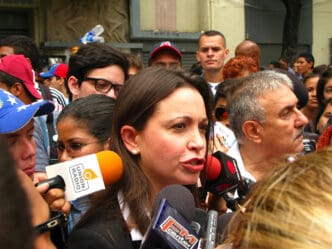Executive Summary
The Story So Far
Why This Matters
Who Thinks What?
María Corina Machado, a prominent Venezuelan opposition leader, has been awarded the 2025 Nobel Peace Prize for her steadfast commitment to democracy. The Norwegian Nobel Committee announced Friday, October 10, 2025, in Oslo, that Machado received the accolade for “keeping the flame of democracy burning amid a growing darkness” and for her efforts to achieve a just and peaceful transition from dictatorship in Venezuela.
Machado’s Background and Activism
Born in Caracas in 1967, Machado, an industrial engineer by training, founded Súmate in 2002, a volunteer organization dedicated to promoting political rights and monitoring elections. She has consistently advocated for “ballots over bullets,” and the Nobel committee praised her as “one of the most extraordinary examples of civilian courage in Latin America in recent times.” Upon receiving the news, Machado expressed profound surprise, stating, “Oh my god… I have no words.”
Machado views the award as an “impetus” for all Venezuelans to “complete our task: achieving freedom.” She added that her movement relies on the support of President Trump, the United States, Latin American nations, and democratic countries worldwide to achieve freedom and democracy in Venezuela.
Disputed Election and Political Repression
Venezuela’s democratic institutions have faced significant deterioration since 1999, exacerbated by a severe crackdown under President Nicolás Maduro’s government. Machado’s attempt to run against Maduro in the 2024 presidential election was voided by the regime. She subsequently endorsed Edmundo González Urrutia, working to mobilize citizens and train election observers to ensure a free and fair vote.
Following the 2024 election, both Maduro and González claimed victory. Electoral authorities aligned with the government declared Maduro the winner with 51.95% of the vote, a result disputed by opposition forces who cited “suspicious” data patterns. Machado asserted that she possessed evidence indicating Maduro lost “in a landslide to Edmundo, 67% to 30%,” with receipts from over 80% of polling stations. The Nobel committee commended her for documenting tallies before the regime could destroy ballots, a claim that the Biden administration also supported, citing “overwhelming evidence” of Maduro’s defeat.
In the aftermath of the election, the Maduro government intensified its crackdown on dissent. Human Rights Watch reported that the government has “killed, tortured, detained, and forcefully disappeared people seeking democratic change.” Machado has been living in hiding in Venezuela since last year, briefly reappearing during protests in January. Speaking to CNN in August 2024 from an undisclosed location, she described the regime as having “lost total touch with reality” and its social base, enabling her movement to mobilize millions of Venezuelans committed to democracy despite operating with limited resources and under strict censorship.
International Reactions and Prize Significance
The White House criticized the Nobel Committee for overlooking President Trump’s peacemaking efforts, despite Trump having previously praised Machado in January for “peacefully expressing the voices and the WILL of the Venezuelan people.” Communications director Steven Cheung stated, “The Nobel Committee proved they place politics over peace.” This award comes amidst escalating tensions between the United States and Venezuela, characterized by US military actions against alleged “narco-trafficking” vessels and a $50 million reward for information leading to Maduro’s arrest on drug trafficking charges.
Jørgen Watne Frydnes, chair of the Norwegian Nobel Committee, affirmed that Machado fully satisfied the criteria set out in Alfred Nobel’s will, which emphasizes fraternity between nations and the promotion of peace. Frydnes highlighted her success in uniting Venezuela’s opposition, her resistance to the militarization of Venezuelan society, and her unwavering support for a peaceful democratic transition.
Analysts noted that the committee’s choice signals concerns about the global health of democracy. Karim Haggag, director of the Stockholm International Peace Research Institute (SIPRI), commented that the award underscores democracy as a priority “at a time of global backsliding of democratic values and norms.” Nina Græger, director of the Peace Research Institute Oslo, emphasized that the prize is “above all, a prize for democracy,” highlighting the courage of those who defend freedom through electoral processes.
The Nobel Peace Prize includes a cash award of 11 million Swedish kronor (approximately $1 million) and will be formally presented at a ceremony in Oslo in December. Frydnes expressed uncertainty about Machado’s ability to attend due to serious security concerns in Venezuela.
Key Takeaways
María Corina Machado’s 2025 Nobel Peace Prize recognizes her courageous and persistent efforts to uphold democratic principles in Venezuela, a nation struggling under authoritarian rule. The award underscores the global importance of defending democracy and highlights the personal risks taken by activists in the face of political repression, while also drawing attention to ongoing geopolitical tensions involving Venezuela and the United States.








